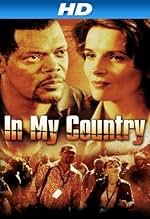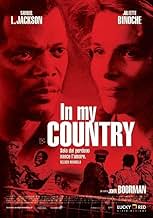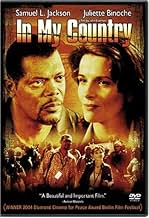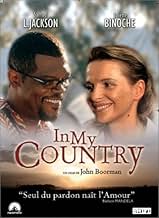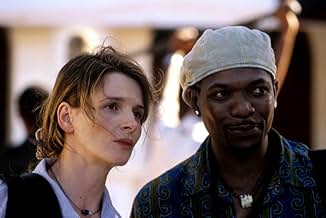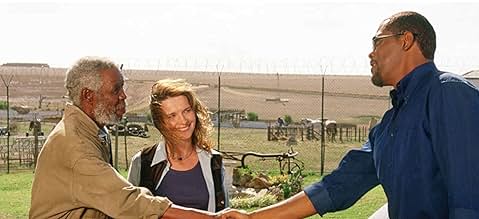IMDb-BEWERTUNG
6,0/10
3018
IHRE BEWERTUNG
Füge eine Handlung in deiner Sprache hinzuA journalist and a poetess meet during the hearings of South African Truth and Reconciliation Commission.A journalist and a poetess meet during the hearings of South African Truth and Reconciliation Commission.A journalist and a poetess meet during the hearings of South African Truth and Reconciliation Commission.
- Regie
- Drehbuch
- Hauptbesetzung
- Auszeichnungen
- 1 Gewinn & 3 Nominierungen insgesamt
Menzi Ngubane
- Dumi Mkhalipi
- (as Menzi 'Ngubs' Ngubane)
Harriet Lenabe
- Albertina Sobandla
- (as Harriet Manamela)
Dan Robbertse
- Sgt. de Smidt
- (as Daniel Robbertse)
Empfohlene Bewertungen
I thought this movie did very well in exploring many different relationships and story lines. Above all, this movie asked all of the hard questions and brought into light a lot of truth that a lot of people don't like to look at.
The African sense of justice is about reconciliation, not revenge. By using the testimonials of several individuals, this movie was very educational. The healing that was allowed to happen within the process of reconciliation was very inspirational. Their sophisticated system made a lot of sense to me, and seems much more advanced than systems employed where i live in the US.
The relationship between Langston and Anna brought a political story to a personal level. It was beautiful to see Anna come to terms with her own sense of responsibility, being a white south African who had known of the atrocities, but had done nothing to stop them. Langston forced her to examine her position, but was also there to support her when she felt crushed by the enormity. Their acting was very convincing and skillful. I especially loved the scene where Anna attacked Langston, but thought the actual sex scene could have been more believable.
One character I haven't seen anyone comment on is Anna'a assistant, Dumi. This character brought the story to yet another level. He was the classic joker with hidden depths. His character communicated to the audience that nothing is black or white; nothing is simple; really it's all endlessly complex.
In fact, this story was anything but one-sided. It showed many masks that individuals wear in specific situations. It communicated so much about humanity, both as individuals and as members of a larger society. I find it quite relevant to my experience as a white American who knows my government is responsible for the suffering of multitudes at this moment in time, and I feel responsible and helpless at the same time.
A man who sat behind me in the theater kept telling his girlfriend he wanted to leave because it was unpleasant. Yes, it is unpleasant, if you're the type of person who doesn't like to look at reality. But what I cam away with from the movie was a feeling of awe about humanity's capacity for compassion.
The African sense of justice is about reconciliation, not revenge. By using the testimonials of several individuals, this movie was very educational. The healing that was allowed to happen within the process of reconciliation was very inspirational. Their sophisticated system made a lot of sense to me, and seems much more advanced than systems employed where i live in the US.
The relationship between Langston and Anna brought a political story to a personal level. It was beautiful to see Anna come to terms with her own sense of responsibility, being a white south African who had known of the atrocities, but had done nothing to stop them. Langston forced her to examine her position, but was also there to support her when she felt crushed by the enormity. Their acting was very convincing and skillful. I especially loved the scene where Anna attacked Langston, but thought the actual sex scene could have been more believable.
One character I haven't seen anyone comment on is Anna'a assistant, Dumi. This character brought the story to yet another level. He was the classic joker with hidden depths. His character communicated to the audience that nothing is black or white; nothing is simple; really it's all endlessly complex.
In fact, this story was anything but one-sided. It showed many masks that individuals wear in specific situations. It communicated so much about humanity, both as individuals and as members of a larger society. I find it quite relevant to my experience as a white American who knows my government is responsible for the suffering of multitudes at this moment in time, and I feel responsible and helpless at the same time.
A man who sat behind me in the theater kept telling his girlfriend he wanted to leave because it was unpleasant. Yes, it is unpleasant, if you're the type of person who doesn't like to look at reality. But what I cam away with from the movie was a feeling of awe about humanity's capacity for compassion.
I am not a big fan of romances, but in this case I gave it a try because of director John Boorman ["Excalibur," "The Emerald Forest," "Hope & Glory, "Deliverance"] and actors Samuel L. Jackson ["Coach Carter," "Star Wars: Episodes 2 & 3," "The Red Violin"] and Juliette Binoche ["Chocolat," "The English Patient," and the 1992 remake of "Wuthering Heights"].
This film was in the better half of Boorman's, while Jackson and Binoche gave top-notch performances. The supporting role of Dumi, played by Menzi Ngubane was excellent, as he acted both as foil and antagonist between the couple.
I think the weakest elements of this film are in screenwriter Ann Peacock's dialogue and in the construction of the Anna Malan and brother Boetie characters. The first for taking on just a little too much burden of responsibility, especially in one somewhat uncharacteristic scene at one of the hearings with a particularly gory testimony, and the latter for being incomplete when a key development occurs that should have played more into the storyline and into Anna's reactions.
From what I've heard about the book by Antje Krog, I can understand why anyone who had read it before seeing this movie might be disappointed, but it was certainly clear to me by the marketing that this was a romance and not a cinematic litany of the horrors of Apartheid.
Given the turbulent background of Apartheid and the South African Truth & Reconciliation Commission proceedings, along with other clues, I was also expecting this to be an adversaries-fall-in-love story, which is the type of romance that I like the most. The collective incidents which drive Anna and Langston together are neither contrived or turgid, and fall comfortably in between, especially because they are juxtaposed with events based in reality. There is one most significant turn at one of the hearings, which, given it is true, would bring any two adversaries together, in peace if not in love.
I don't want to give away anything about the extent of their romance, except to say that how it ended up was a pleasant surprise and quite satisfactory. I wish I could recommend two other good romances that end so similarly and satisfactorily, but I would give away the surprise.
This film is certainly worth a rental or two, worth showing to friends, but I suppose the disturbing nature of the background events might keep some people from buying it for their home library, but if you bought a copy of "American History X," I think you might want to buy this one.
This film was in the better half of Boorman's, while Jackson and Binoche gave top-notch performances. The supporting role of Dumi, played by Menzi Ngubane was excellent, as he acted both as foil and antagonist between the couple.
I think the weakest elements of this film are in screenwriter Ann Peacock's dialogue and in the construction of the Anna Malan and brother Boetie characters. The first for taking on just a little too much burden of responsibility, especially in one somewhat uncharacteristic scene at one of the hearings with a particularly gory testimony, and the latter for being incomplete when a key development occurs that should have played more into the storyline and into Anna's reactions.
From what I've heard about the book by Antje Krog, I can understand why anyone who had read it before seeing this movie might be disappointed, but it was certainly clear to me by the marketing that this was a romance and not a cinematic litany of the horrors of Apartheid.
Given the turbulent background of Apartheid and the South African Truth & Reconciliation Commission proceedings, along with other clues, I was also expecting this to be an adversaries-fall-in-love story, which is the type of romance that I like the most. The collective incidents which drive Anna and Langston together are neither contrived or turgid, and fall comfortably in between, especially because they are juxtaposed with events based in reality. There is one most significant turn at one of the hearings, which, given it is true, would bring any two adversaries together, in peace if not in love.
I don't want to give away anything about the extent of their romance, except to say that how it ended up was a pleasant surprise and quite satisfactory. I wish I could recommend two other good romances that end so similarly and satisfactorily, but I would give away the surprise.
This film is certainly worth a rental or two, worth showing to friends, but I suppose the disturbing nature of the background events might keep some people from buying it for their home library, but if you bought a copy of "American History X," I think you might want to buy this one.
A black journalist of Washington Post, Langton Whitfield; is sent by provocation by his boss to South Africa in order to "cover" the auditions of proceedings named Truth and Reconciliation Commission, that must decide if murders and torture authors can be amnestied if they say truth on act that they have made and express regrets in face of their victims. Langston encounters a young Afrikaner woman who follows also for South African radio the same sessions. She discovers the horror of Apartheid politics and she is bowled over by these facts. In these circumstances, Langston and Anna bring closer together. It is the story of the deep of human cruelty and also of the power of love and forgetting. The movie is dramatic and well played by Samuel L. Jackson and Juliette Binoche, but seems to be a little too oriented and melodramatic.
Watching any one of the three - Juliette Binoche, Samuel L. Jackson, Brendan Gleeson - painting a wall would be a good use of time. Seeing them all in the same movie is a rare treat.
Jackson (Pulp Fiction) is Langston Whitfield from the Washington Post, sent to monitor the Truth and Reconciliation Commission hearings in South Africa. To avoid bloodshed, the commission asked white Afrikaners to appear before a public tribunal, confess exactly what they did, convince the commission they were acting under orders, make a believable apology, and amnesty will be given.
Bonoche (The English Patient, Chocolat)is Anna Malan, a poet, who is doing daily broadcasts for the South African Broadcasting Company.
Gleeson (In Bruges, Into the Storm, The Guard) is De Jager, a a South African cop with a zeal for torture and murder that went far beyond his job requirements; a reputed psychopath that is taking the fall for all the other criminals his superiors, in a new South Africa.
Anna finds out things she really didn't want to know, and Whitfield finds that truth is not so black and white, as he believed.
Jackson (Pulp Fiction) is Langston Whitfield from the Washington Post, sent to monitor the Truth and Reconciliation Commission hearings in South Africa. To avoid bloodshed, the commission asked white Afrikaners to appear before a public tribunal, confess exactly what they did, convince the commission they were acting under orders, make a believable apology, and amnesty will be given.
Bonoche (The English Patient, Chocolat)is Anna Malan, a poet, who is doing daily broadcasts for the South African Broadcasting Company.
Gleeson (In Bruges, Into the Storm, The Guard) is De Jager, a a South African cop with a zeal for torture and murder that went far beyond his job requirements; a reputed psychopath that is taking the fall for all the other criminals his superiors, in a new South Africa.
Anna finds out things she really didn't want to know, and Whitfield finds that truth is not so black and white, as he believed.
This movie is flawed, but it's not over-dramatic or misleading. The grieving style of the victims is very realistic. The TRC scenes are a dead ringer for the real thing, and I HAVE seen both. The idea of Ubuntu is simple and the movie doesn't "oversimplify it". It also doesn't state that all South Africans believe in Ubuntu - far from it. It's odd that so many overseas reviewers think they know that the movie is pandering to them and oversimplifying Africa. Cleary it's not simplifying it enough! Sure, having overseas actors means it's a bit foreign, but if there weren't big name international stars in it you might not be able to find the damn thing on this site. oh, and by the way, Realise is spelled with an S in Africa.
Wusstest du schon
- WissenswertesAfter seeing this film Nelson Mandela called it, "a beautiful and important film about South Africa's Truth and Reconciliation Commission. It will engage and influence not only South Africans, but people all over the world concerned with the great questions of human reconciliation, forgiveness, and tolerance."
- PatzerAll number plates on vehicles throughout the film (apart from archival footage) are fake and do not follow the format of older South African number plates.
- Zitate
Anna Malan: [last lines - voiceover] Because of you, this land no longer lies between us but within. It breathes becalmed, after being wounded in its wondrous throat. In the cradle of my skulll it sings, it ignites my tongue. Five thousand stories are scorched on your skin. I am changed forever.. I want to say, forgive me, forgive me, forgive me.
- VerbindungenEdited into In My Country: Deleted Scenes (2005)
- SoundtracksSenzenina
Arranged by Murray Anderson & Warrick Swinney
Performed by Princess Soi-Soi Gqeza, Mxolisi Mayekane, Mandia Lande, Michael Ludonga, Simpiwe Matole & The New Teenage Gospel Choir
Published by Hi-Z Sound
Top-Auswahl
Melde dich zum Bewerten an und greife auf die Watchlist für personalisierte Empfehlungen zu.
- How long is In My Country?Powered by Alexa
Details
- Erscheinungsdatum
- Herkunftsländer
- Offizielle Standorte
- Sprachen
- Auch bekannt als
- Country of My Skull
- Drehorte
- Produktionsfirmen
- Weitere beteiligte Unternehmen bei IMDbPro anzeigen
Box Office
- Budget
- 12.000.000 $ (geschätzt)
- Bruttoertrag in den USA und Kanada
- 163.893 $
- Eröffnungswochenende in den USA und in Kanada
- 22.383 $
- 13. März 2005
- Weltweiter Bruttoertrag
- 1.491.434 $
- Laufzeit1 Stunde 45 Minuten
- Farbe
- Sound-Mix
- Seitenverhältnis
- 1.85 : 1
Zu dieser Seite beitragen
Bearbeitung vorschlagen oder fehlenden Inhalt hinzufügen



